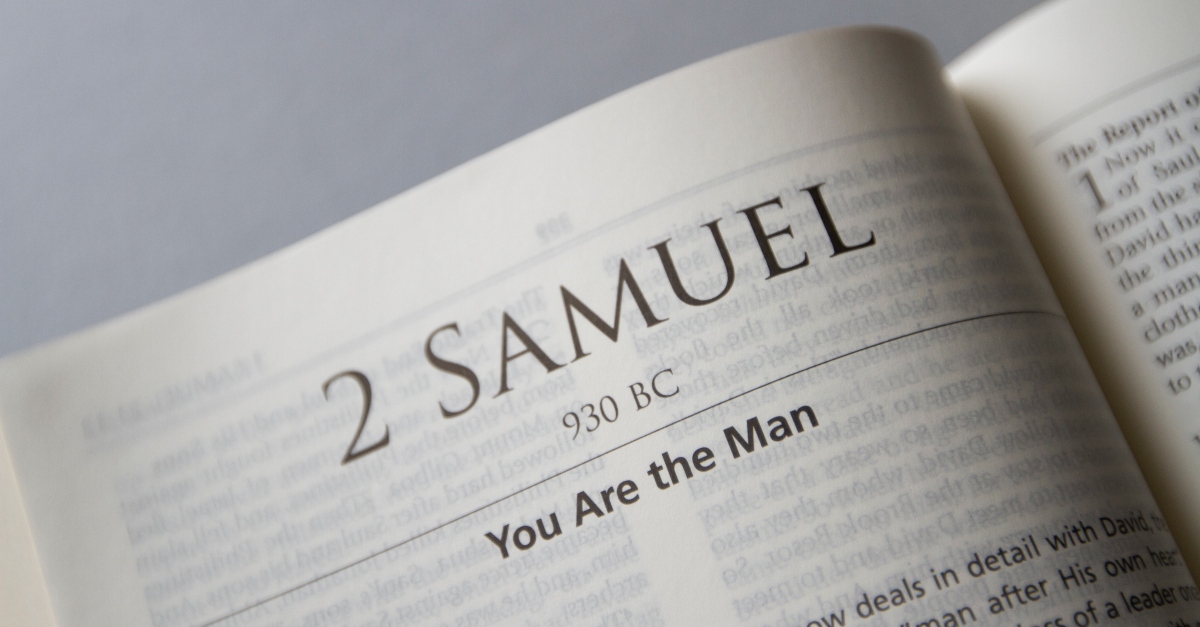These are all of the chapters of the book of 2 Samuel. Clicking on a chapter will show you the text of that chapter of 2 Samuel in the Bible (New International Version).
The authorship of 2 Samuel is unknown. This book, along with 1 Samuel were originally a single volume in the Hebrew canon. Traditionally the prophet Samuel was considered the author of the books of Samuel. And it is likely that he contributed to it. However, Samuel died prior to the completion of 1 Samuel, meaning he could not be the author of 2 Samuel.
In 2 Samuel 1:18 we find a reference to the Book of Jashar. 1 Chronicles 27:24 mentions the Annals of David and 1 Chronicles 29:24 mention the records of Samuel, Nathan and Gad. The references in 1 Chronicles do not prove that these other records were used as sources in 2 Samuel, but it is clear there were multiple historical records available for whoever did write 2 Samuel.
Adam Clark concludes that (1) the books of Samuel and Kings were constructed using original documents; (2) that the compiler was not contemporary with the events he narrates; (3) that the date and authorship of these books, while more recent that the events records, are uncertain.
Second Samuel is one of the books that Christians label as historical. But the Jews included 2 Samuel in a grouping called the Former Prophets. The Former Prophets included Joshua, Judges and the books of Samuel and Kings. These books reflect the teachings of the Torah.
Second Samuel chronicles the reign of David. It starts with word reaching him of Saul’s death, and it ends near the end of David’s life. By and large, David’s reign is good and he is faithful to God. But he does make a few bad choices that haunt him for the remainder of his life and cause some turmoil in his reign.
David is one of the most significant characters in the history of Israel. Abraham was the literal father of the people. Moses was the deliverer who brought them out of Egypt and gave them the law. But David was the one who really established Israel as a nation, uniting the tribes into a cohesive nation. So, it is only appropriate that the author of this history spent so much time on David’s life and reign.
Robert Bergen identifies five potential purposes for the writing of 2 Samuel. It is first, a book of history. It chronicles the life and ministry of David, Israel’s second and greatest king.
The second potential purpose that Bergen identifies is that it is a work of literature. The central plot of 2 Samuel involves kings, international wars, ambition, murder and deception. It has complex character portrayals, varied settings, wordplays and allusions. While 2 Samuel is certainly more than just literature, it clearly does display many of the characteristics of a classic piece of literature.
Second Samuel also has some of the characteristics of an apology. The book describes David’s reign as king of a united Israel. While some might have viewed David as a usurper, the author of 2 Samuel clearly portrays him as God’s anointed king. Further, David’s treatment of Saul’s family demonstrates that he had been a faithful subject to Saul, in spite of Saul’s treatment of him.
Second Samuel is also a book of theology, supporting the teachings of the Torah. The book supports the idea of a covenant God, one who has a covenantal relationship with his people. It supports the emphasis of the Torah on the possession of the land of Israel. There is an emphasis on the presence of God among the people, and there is a call for wholehearted obedience to God.
Finally, 2 Samuel can be viewed as Scripture. This book is part of the inspired word of God that has been used by Jew and Christian alike for insight into God’s working in the world. As such, it offers encouragement to live faithfully before God.
Early in David’s reign over a unified kingdom he looked for a new capital (2 Sam. 5:6-9). He chose Jerusalem – but Jerusalem was under the control of the Jebusites. Secure behind their high and strong walls, they taunted David. But David was able to conquer the city and make it his home and the capital of his kingdom. This teaches us that we should never be intimidated by powerful obstacles or people. Be faithful to God’s direction and He will see his tasks accomplished, despite the opposition.
In the sixteenth chapter of 1 Samuel, David was anointed by Samuel to be king. And yet he had to wait for the right time. In 1 Samuel David has several opportunities to eliminate Saul and take the throne by force. But David refuses to do so. But, as 2 Samuel opens, we find that the way had opened for David to take the throne. He had been faithful to God, waiting for God’s timing, and refused to take matters into his own hands. That is a lesson that many of us need to learn today. Patience is hard. As is trusting in God’s timing. But it is for the best.
David was generally faithful to God and his commands. But not always. David’s affair with Bathsheba, and the murder of Uriah her husband, had long lasting consequences for David, his family, and the nation he led. It is not possible to know how David’s family might have turned out if David had walked away from Bathsheba. But much of the turmoil in his family was directly attributable to that event. The Prophet Nathan told David that because of what he did, the sword would never depart from his family (2 Sam. 12:10-11). And that conflict eventually spilled over into civil war with Absalom’s rebellion against David. It is important to realize that there is no such thing as private sin. Our sin is always against God, and frequently impacts other people who are otherwise innocent.
2 Samuel 5:6-7: “Nevertheless, David captured the fortress of Zion—which is the City of David.” The confidence of the Jebusites was misplaced, thinking their strong walls would protect them from David. Physical walls, no matter how strong, cannot resist God-led people.
2 Samuel 7:16: “Your house and your kingdom will endure forever before me; your throne will be established forever.” God made a tremendous promise to David – a promise that has found fulfillment in Jesus.
2 Samuel 22:2: “The Lord is my rock, my fortress and my deliverer.” This is part of a psalm of David that extols the provision of God.
2 Samuel 23:10, 12: “Then the Israelites retreated, but Eleazar stood his ground and struck down the Philistines till his hand grew tired and froze to the sword. The Lord brought about a great victory that day. The troops returned to Eleazar, but only to strip the dead … Israel’s troops fled from them. But Shammah took his stand in the middle of the field. He defended it and struck the Philistines down, and the Lord brought about a great victory.” This tells the stories of two of David’s mighty men, Eleazar and Shammah. These men each stood their ground, even when the rest of the army fled. And in both cases God brought about a great victory.
The New American Commentary: Robert D. Bergen, Holman Reference, 1996. Print.
Adam Clarke’s Commentary on the Holy Bible: Adam Clark, Baker Book House, 1967. Print.
The Expositor’s Bible Commentary Abridge Edition: Old Testament: Kenneth L. Barker and John R. Kohlenberger III, Zondervan Academic, 2004. Print.
Photo credit: ©Sparrowstock
 Ed Jarrett is a long-time follower of Jesus and a member of Sylvan Way Baptist Church. He has been a Bible teacher for over 40 years and regularly blogs at A Clay Jar. You can also follow him on Twitter or Facebook. Ed is married, the father of two, and grandfather of three. He is retired and currently enjoys his gardens and backpacking.
Ed Jarrett is a long-time follower of Jesus and a member of Sylvan Way Baptist Church. He has been a Bible teacher for over 40 years and regularly blogs at A Clay Jar. You can also follow him on Twitter or Facebook. Ed is married, the father of two, and grandfather of three. He is retired and currently enjoys his gardens and backpacking.
